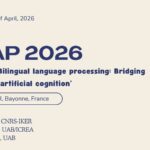14 juliol, 2021
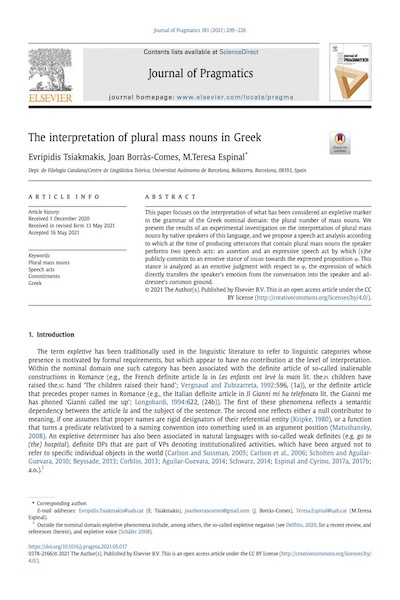
Autors:
Evripidis Tsiakmakis, Joan Borràs-Comes, M.Teresa Espinal
Títol:
The interpretation of plural mass nouns in Greek, Journal of Pragmatics 181Editorial: Elsevier
Data de publicació: Agost 2021
Més informacióThis paper focuses on the interpretation of what has been considered an expletive marker in the grammar of the Greek nominal domain: the plural number of mass nouns. We present the results of an experimental investigation on the interpretation of plural mass nouns by native speakers of this language, and we propose a speech act analysis according to which at the time of producing utterances that contain plural mass nouns the speaker performs two speech acts: an assertion and an expressive speech act by which (s)he publicly commits to an emotive stance of dislike towards the expressed proposition φ. This stance is analyzed as an emotive judgment with respect to φ, the expression of which directly transfers the speaker's emotion from the conversation into the speaker and addressee's common ground.
13 abril, 2021
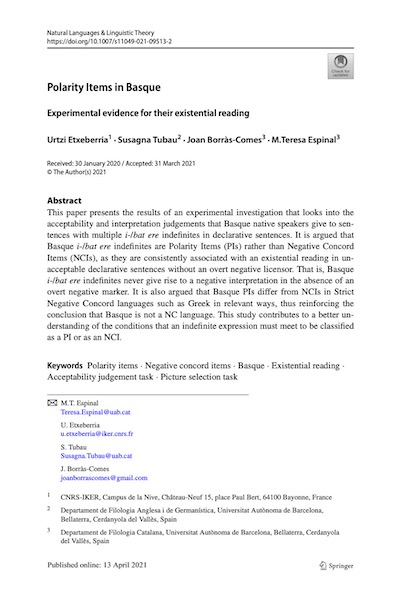
Autors:
Urtzi Etxeberria, Susagna Tubau, Joan Borràs-Comes & M.Teresa Espinal
Títol:
Polarity Items in BasqueEditorial: Natural Language & Linguistic Theory, Springer
Data de publicació: 13 d'abril del 2021
This paper presents the results of an experimental investigation that looks into the acceptability and interpretation judgements that Basque native speakers give to sentences with multiple i-/bat ere indefinites in declarative sentences. It is argued that Basque i-/bat ere indefinites are Polarity Items (PIs) rather than Negative Concord Items (NCIs), as they are consistently associated with an existential reading in unacceptable declarative sentences without an overt negative licensor. That is, Basque i-/bat ere indefinites never give rise to a negative interpretation in the absence of an overt negative marker. It is also argued that Basque PIs differ from NCIs in Strict Negative Concord languages such as Greek in relevant ways, thus reinforcing the conclusion that Basque is not a NC language. This study contributes to a better understanding of the conditions that an indefinite expression must meet to be classified as a PI or as an NCI.
27 octubre, 2020
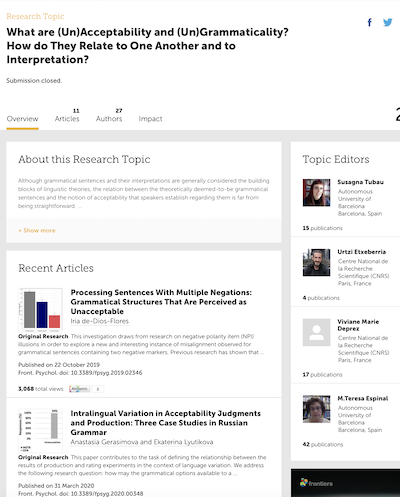
Autors:
S. Tubau, U. Etxeberria, V. Déprez i M.T. Espinal (coeditors)
Títol:
Research topic: What are (un)acceptabiity and (un)grammaticality? How do they relate to one another and to interpretation? Frontiers in PsychologyEditorial: Frontiers
Data de publicació: 2020
Més informacióAlthough grammatical sentences and their interpretations are generally considered the building blocks of linguistic theories, the relation between the theoretically deemed-to-be grammatical sentences and the notion of acceptability that speakers establish regarding them is far from being straightforward.
Some grammatical sentences that present parsing complications (e.g. garden-path sentences) might appear unacceptable to speakers, as they are difficult to understand. Other sentences, considered as ungrammatical by theoreticians (e.g. wh-island violations, sentences with resumptive pronouns, semantically implausible sequences, and sentences with unlicensed negative polarity items) might be perceived as acceptable by speakers and lead to reliable interpretations.
To further complicate matters, recent research on how grammatical 'illusions' (e.g. negative polarity item licensing, and comparative illusions) are perceived, understood and processed has revealed that speakers can subconsciously correct ungrammatical or ill-formed sentences by making use of specific repair strategies. Studies have also revealed that adults can learn to understand novel constructions considered to be syntactically ungrammatical (e.g. the ‘needs’ construction).
Taking into account these experimental results, there is now a fundamental need for novel operational, empirically and theoretically grounded redefinitions for core notions such as:
(un)acceptability; (un)grammaticality and, finally, the continual exploration of the existing complex interactions between sentences’ (un)acceptability and (un)grammaticality and their final interpretation.
In this vein, it seems necessary to evaluate how suitable specialized research methods can be, to establish the degree and extent to which particular linguistic structures and their interpretations are acceptable or unacceptable to speakers and how this can reliably relate to theoretical (un)grammaticality. If necessary, more analytic methodologies (e.g. acceptability scales, elicitation techniques, time forced-choice tasks, etc.) must be developed in order to provide dependable results informing on linguistic theory. This should lead to (i) a better understanding of what makes (un)grammatical sentences (un)acceptable or the other way around, (ii) a better account of speaker’s preferences and optionality in connection to (un)acceptability and (un)grammaticality, and (iii) the role of performance factors, memory limitations, and processing mechanisms in the evaluation of (un)acceptability, (un)grammaticality, and interpretation of linguistic structures.
We welcome manuscripts addressing any of the following topics and subtopics from theoretical and/or experimental perspectives, covering a wide range of languages and linguistic structures:
-What is (un)acceptability in linguistics?
-How does (un)acceptability relate to (un)grammaticality?
-Methodological issues related to (un)acceptability and/or (un)grammaticality.
-How are speaker's preferences and optionality connected to (un)acceptability and (un)grammaticality?
-What factors are relevant for the evaluation of (un)acceptability, (un)grammaticality, and interpretation of linguistic structures?
25 març, 2020
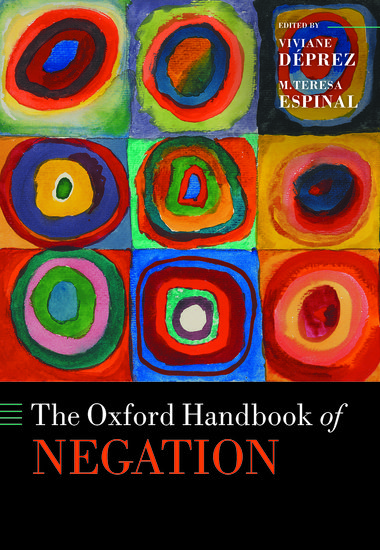
Autors:
Déprez, V. & M.T. Espinal (eds.)
Títol:
The Oxford Handbook of NegationEditorial: Oxford University Press
Data de publicació: 25 de març del 2020
Pàgines: 896ISBN13: 9780198830528
Més informacióIn this volume, international experts in negation provide a comprehensive overview of cross-linguistic and philosophical research in the field, as well as accounts of more recent results from experimental linguistics, psycholinguistics, and neuroscience. The volume adopts an interdisciplinary approach to a range of fundamental questions ranging from why negation displays so many distinct linguistic forms to how prosody and gesture participate in the interpretation of negative utterances. Following an introduction from the editors, the chapters are arranged in eight parts that explore, respectively, the fundamentals of negation; issues in syntax; the syntax-semantics interface; semantics and pragmatics; negative dependencies; synchronic and diachronic variation; the emergence and acquisition of negation; and experimental investigations of negation. The volume will be an essential reference for students and researchers across a wide range of disciplines, and will facilitate further interdisciplinary work in the field.
3 setembre, 2019
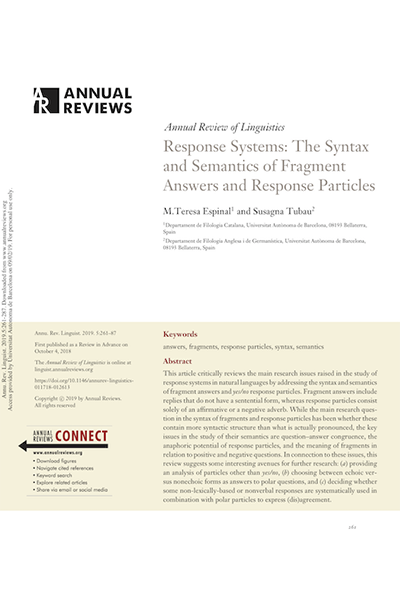
Autors:
M.Teresa Espinal i Susagna Tubau
Títol:
Response Systems: The Syntax and Semantics of Fragment Answers and Response ParticlesEditorial: Annual Review of Linguistics
Data de publicació: 20 de gener de 2019
Pàgines: 28 Més informació
Text complet
This article critically reviews the main research issues raised in the study of response systems in natural languages by addressing the syntax and semantics of fragment answers and yes/no response particles. Fragment answers include replies that do not have a sentential form, whereas response particles consist solely of an affirmative or a negative adverb. While the main research question in the syntax of fragments and response particles has been whether these contain more syntactic structure than what is actually pronounced, the key issues in the study of their semantics are question–answer congruence, the anaphoric potential of response particles, and the meaning of fragments in relation to positive and negative questions. In connection to these issues, this review suggests some interesting avenues for further research: (a) providing an analysis of particles other than yes/no, (b) choosing between echoic versus nonechoic forms as answers to polar questions, and (c) deciding whether some non-lexically-based or nonverbal responses are systematically used in combination with polar particles to express (dis)agreement.










